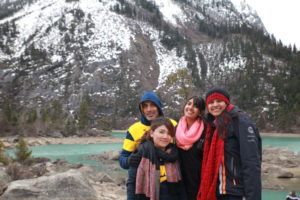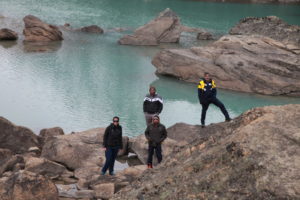Today we were supposed to make it to Pomi but we only managed to make it to Raou, a small highway town with just one main road. The distance wasn’t much but winding mountain roads slowed us down. By the time lunch rolled around, we had only covered 100km, despite setting out at 5 am.
It was a long and tiring drive .The roads were pretty bad in certain stretches, a far cry from the roads we encountered on the first day. Tibet has a long way to go in terms of development but the question remains whether the Chinese government is purposely neglecting this region or if they just haven’t ‘gotten to it yet’. Additionally, the police run a pretty tight ship in Tibet. We are required to register with the local police each time we enter a large town. They act almost paranoid. What they are afraid of, is something I’m yet to comprehend.
We reached Raou around nightfall. As far as accommodation was concerned, our options were extremely limited. We were escorted to our rooms, which were extremely impressive. Gold trim med interiors and intricate ceiling designs adorned the room bathed in the glow of soft yellow lights. We also had a beautiful view of the mountains and a large lake. It was too good to be true and too good to be true, it was. Here’s the catch. Small villages like Raou do not receive electricity after 12 am. This means no heating in the room and no hot water. The snow began to fall and temperatures dipped. We were in for a long night.
med interiors and intricate ceiling designs adorned the room bathed in the glow of soft yellow lights. We also had a beautiful view of the mountains and a large lake. It was too good to be true and too good to be true, it was. Here’s the catch. Small villages like Raou do not receive electricity after 12 am. This means no heating in the room and no hot water. The snow began to fall and temperatures dipped. We were in for a long night.
In contrast to the uninviting weather outside, we were given the warmest welcome by the staff of the tiny restaurant. As we tried to communicate our order, I realised that the language barrier is self constructed. If you really wish to communicate, both parties can make the effort to understand.
I has a nice conversation with a 20 year old girl through a translation app. It was then that I realised that this tiny cold village nestled among the highest peaks in interior Tibet was all she had ever known.
Fun fact, Tibetan people are not issued passports for it is feared that they will emigrate to other countries. I recall conversation with our Tibetan guide Deji, who told me that she was happy in Tibet but all she just wanted to travel the world. I realise how blessed I am. Truly lucky to be able to do what I’m doing and that most borders for me are just lines on a map and don’t represent the walls of a prison I can’t escape.
The night was cold and morning couldn’t come fast enough. Did we survive? Of course! Was it comfortable? Not one bit. But at the end of theday we’ve got ourselves a story to tell and an experience to learn from. Something that’s much more valuable than a good night’s sleep.

Leave Comment